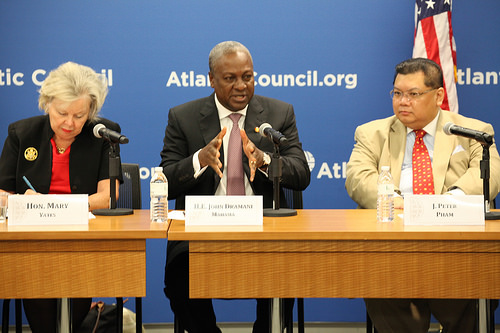President John Dramani Mahama has asked development partners to provide West Africa with the requisite technical support and training to enable the sub-region to confront emerging security threats.
He mentioned the threat posed by terrorists in the North Eastern parts of Nigeria, Mali, and the impending general elections in six African countries with potential related disputes, saying these were threats that could destabilize in the area.
A statement signed by the Flagstaff House Communication Bureau and copied to the Ghana News Agency, said the President Mahama made the call during a meeting with the Atlantic Council, a highly prestigious American foreign policy think tank, in Washington DC as part of his 10- day visit to the USA.
President Mahama, according to the statement, stressed that in the light of the situation, the Sub-region would need logistical, technical and training support for peace keepers to be able to maintain peace and security.
The Council, made up of retired US Generals, diplomats, accomplished business men and economists, provides thought leadership on emerging security, geopolitical, and economic challenges in Africa, through congressional testimony, publications, briefings, events, and a robust media presence.
The Centre assists policymakers in addressing the complex security challenges facing Africa, including the problems of state collapse; humanitarian crises; piracy; the growing nexus between extremism and criminality in West Africa and the Sahel.
President Mahama, who is also the Chairman of ECOWAS, said he would use his tenure of office to ensure the consolidation of peace and stability to post-conflict nations in the Sub-region, and asked for the support of the Council.
He pointed out that countries like Sierra Leone, which emerged from years of conflict were performing positively economically and underscored the importance of ensuring that the gains were built upon to avoid a relapse.
President Mahama reminded Africa’s development partners that the price to pay for democracy, progress and development was eternal vigilance. “We need investments in social protection and intervention,” he stated.
Cautioning about a potential spill-over effect in more African countries of the threat posed by Boko Haram and other rebel groups, President Mahama stated that: “We believe there is a link between what is happening in the North Eastern parts of Nigeria and the Central African Republic.”
The President, according to the statement, gave the assurance that Ghana would continue to play a role in the sub-regional body in terms of democracy, promotion of the rule of law and human rights, and the maintenance of peace and security.
President Mahama reiterated his intention to push the regional integration agenda forward as quickly as possible, particularly the free movement of goods and services and enhanced intra-African trade.
He was also keen to follow through on the ambitious Abidjan, Lagos Highway project to facilitate the movement of people, goods, and services among West African countries.
President Mahama said significant progress had been made with the integration agenda, citing the approval of the Common External Tariff, endorsement of the Economic Partnership Agreement with the European Union and the signing of the Trade and Investment Framework with the United States.
President Mahama later answered questions from his audience about issues ranging from Ghana’s economic prospects and challenges, the prospects for more oil discovery, the reason behind the IMF move, to his intention to use the platform of the US-Africa Summit to increase understanding between Africa and its Western partners.
The event was moderated by former US Ambassador to Ghana, Mary Carlin Yates, who Co-coordinates the council.
Source: GNA
























